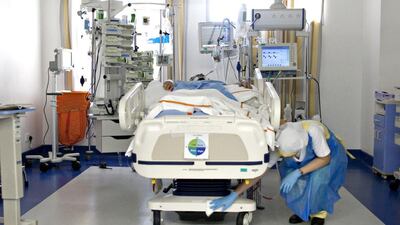ABU DHABI // Hospitals in this country still need to do more to improve infection control to stop patients falling ill, doctors claim.
Hospitals will lose out if they cut investment in this area because patients who have contracted diseases will be reluctant to return to them for treatment, said Dr Manaf Alqahtani, an infectious disease consultant at the Bahrain Defence Force Hospital.
“The cost to patients and their families is tremendous and they also lose trust in the hospital. Their lives are effected by these infections, many of which are preventable,” said Dr Alqahtani, who was in Dubai for the Patient Safety Middle East Exhibition and Conference.
“We have to convince the hospital managers to keep infection-control programmes running. They don’t receive a direct revenue from this and are reluctant to invest money or effort. Often they want to cut back on resources and stop funding these operations,” he said.
“The problem is that we can’t really put a specific value on the benefits from an infection-control programme.”
He said it was up to doctors to admit that better infection control was needed.
“There is a misconception that if you admit there is a problem, fingers will be pointed at you. We all have to be accountable for the situation and the problem needs to be addressed and resolved,” he said.
“Also, physicians need to set their egos aside so the gap between nurses and doctors is reduced and they work as a team. Nurses might be able to give valuable input and this will help.”
Sibta Emmanuel, an infection control practitioner in Ajman said she had noticed some hospital administrations were cutting corners on spending on infection control.
“We do use some methods of reducing infections, such as limiting the time a patient is given a catheter to 12 hours, unless it is required for a longer period. Some hospitals leave catheters in for more than 24 hours and this can cause infections.”
Dr Philip Carling, director of infectious diseases and hospital epidemiology at Carney Hospital in Boston, was also visiting the conference in Dubai.
He said infection control involved making sure all levels of staff were aware of good practices.
“Everybody, from the person who cleans the toilet and changes the toilet paper to those responsible for daily cleaning, need to be aware that doing their job right can have an effect and help people recover without acquiring an infection,” he said.
“Give them the data and make the people who work in the shadows aware of these facts.”
Dr Mansour Al Zarouni, director of SRL Diagnostics laboratory in Dubai Healthcare City, said his facility was improving its infection control.
“It is important to encourage, persuade and push for zero hospital-acquired infections. The most important lesson of health care is to not be satisfied with modest improvement,” he said.
Dr Alqahtani also said terminal cleaning – where powerful cleaners are used to eradicate all germs – was equally important.
“You might imagine that there are no germs when you see a shiny floor. In reality there may be a lot of infections. Terminal cleaning is a solution. Washing one’s hands regularly should also be made mandatory,” Dr Alqahtani said.
“Educating people about the importance of infection control is crucial. Putting up posters that generate awareness about the importance of washing your hands or maintaining hygiene are effective methods.
“Each hospital should produce its own messages that it thinks its staff will be able to relate to. We also have to start educating students at medical schools about the importance of infection control so that they are aware of it.”
arizvi2@thenational.ae


